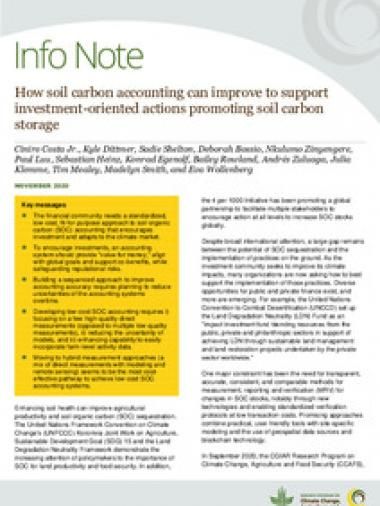How soil carbon accounting can improve to support investment- oriented actions promoting soil carbon storage

Key messages
◼ The financial community needs a standardized, low-cost, fit-for-purpose approach to soil organic carbon (SOC) accounting that encourages investment and adapts to the climate market.
◼ To encourage investments, an accounting system should provide “value for money,” align with global goals and support co-benefits, while safeguarding reputational risks.
◼ Building a sequenced approach to improve accounting accuracy requires planning to reduce uncertainties of the accounting systems overtime.
◼ Developing low-cost SOC accounting requires i) focusing on a few high-quality direct measurements (opposed to multiple low-quality measurements), ii) reducing the uncertainty of models, and iii) enhancing capability to easily incorporate farm-level activity data.
◼ Moving to hybrid measurement approaches (a mix of direct measurements with modeling and remote sensing) seems to be the most cost-effective pathway to achieve low-cost SOC accounting systems.
Citación
Costa Jr C, Dittmer K, Shelton S, Bossio D, Zinyengere N, Luu P, Heinz S, Egenolf K, Rowland B, Zuluaga A, Klemme J, Mealey T, Smith M, Wollenberg E. 2020. How soil carbon accounting can improve to support investment- oriented actions promoting soil carbon storage. CCAFS Info Note. Wageningen, The Netherlands: CGIAR Research Program on Climate Change, Agriculture and Food Security (CCAFS).